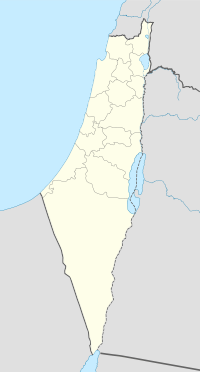Yibna
| Yibna | |
|---|---|

Mamluk minaret in Yibna
|
|
| Arabic | يبنى |
| Name meaning | Built (God "Allah" Builts) |
| Also spelled | Jabneel, Iamnia, Jamnia |
| Subdistrict | Ramle |
| Coordinates | 31°51′58″N 34°44′47″E / 31.86611°N 34.74639°ECoordinates: 31°51′58″N 34°44′47″E / 31.86611°N 34.74639°E |
| Palestine grid | 126/141 |
| Population | 5,420 (1945) |
| Area | 59,554 dunams |
| Date of depopulation | 4 June 1948 |
| Cause(s) of depopulation | Military assault by Yishuv forces |
| Secondary cause | Expulsion by Yishuv forces |
| Current localities | Yavne,Beit Raban, Kfar HaNagid, Beit Gamliel |
Yibna (Arabic: يبنى; Jabneel in Biblical times; Iamnia, Jamnia, or Yavne in Roman times; Ibelin to the Crusaders), was a Palestinian village with a population of 5,420 in 1948, located 15 kilometers southwest of Ramla. Yibna was occupied by Israeli forces on 4 June 1948, and was depopulated during the military assault and expulsion.
Based on written sources and archaeology, the history of Yavneh/Jabneh/Yibna goes back to the Iron Age and possibly to the Bronze Age. The Hebrew Bible mentions Yavneh repeatedly, as does Josephus. For more see Yavne.
The harbour of ancient Yavneh has been identified on the coast at Minet Rubin (Arabic) or Yavne-Yam (Hebrew), where excavations have revealed fortification going back to the Bronze Age Hyksos. It has been in use from the Middle Bronze Age until the 12th century CE, when it was abanodoned. For more see Yavne-Yam.
The Islamic historian al-Baladhuri (died 892 CE) mentioned Yibna as one of ten towns in Jund Filastin conquered by the Rashidun army led by 'Amr ibn al-'As in the early 7th century.
Also in the 9th century, Ya'qubi (died 897/8 CE) wrote that Yubna was an ancient city built on a hill that was inhabited by Samaritans.
...
Wikipedia

